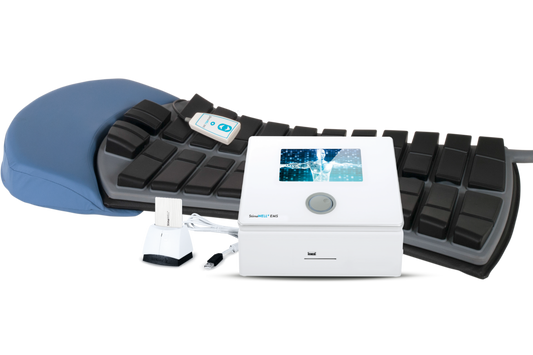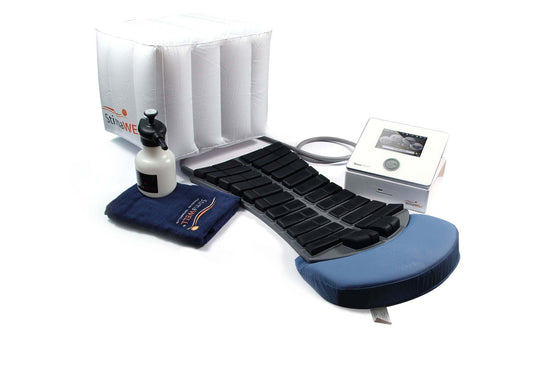
PEMF THERAPY FOR DEPRESSION
PEMF (Pulsed Electromagnetic Field) therapy is emerging as a powerful tool in the battle against depression, offering a non-invasive solution that targets the underlying biological factors associated with these conditions. By using a PEMF mat, individuals suffering from depression can potentially experience significant improvements in mood, reduced symptoms, and enhanced overall well-being. Here's an in-depth look at how PEMF therapy can aid in managing depression and why investing in a PEMF mat could be a transformative step towards better mental health.
Understanding Depression and PEMF Therapy
Depression is a common mental health disorder that can significantly impact daily life, characterized by persistent sadness, loss of interest, nervousness, and worry. While medications and psychotherapy are traditional treatments, they don't work for everyone and can carry side effects. PEMF therapy offers a promising alternative or adjunct by modulating brain activity and enhancing cellular function, potentially addressing some of the physiological roots of this disorder.
How PEMF Therapy Helps with Depression
Neurotransmitter Balancing:
PEMF therapy has been shown to affect the brain’s neurotransmitter levels, including serotonin and dopamine, which play crucial roles in mood regulation. Adjusting these neurotransmitters can help alleviate symptoms of depression, promoting a more balanced emotional state.
Stress Reduction:
Chronic stress is a significant contributor to both depression and anxiety. PEMF therapy helps reduce stress by calming the nervous system, lowering cortisol levels, and promoting relaxation. This can lead to improved coping mechanisms and reduced symptoms of depression.
Sleep Improvement:
Poor sleep is often associated with depression. PEMF therapy can help regulate the body’s sleep cycles by promoting the natural production of melatonin, the hormone responsible for sleep. Better quality sleep can improve mood, energy levels, and overall mental health.
Enhancement of Cellular Energy:
Depression can be exacerbated by diminished cellular function and energy. PEMF therapy stimulates mitochondria, the energy powerhouses of the cells, enhancing cellular metabolism and energy production. This boost in cellular function can contribute to improved mental and physical health, aiding in the recovery from depressive state.
PEMF MAT BENEFITS FOR DEPRESSION
Our PEMF mat is specifically designed to maximize the benefits of PEMF therapy for mental health:
Full-Body Coverage:
The extensive surface area of the mat ensures that therapeutic electromagnetic fields are applied broadly, affecting not just the brain but also the adrenal glands and other body parts that influence stress and mood.
Customizable Settings:
Mental health conditions like depression and anxiety can vary widely in their manifestations. Our PEMF mat offers adjustable settings for intensity and frequency, allowing for tailored treatments that meet individual therapeutic needs.
Ease of Use:
Designed for convenience, our PEMF mat can be used at home, enabling daily therapy sessions that integrate seamlessly into personal routines without the need for continuous medical supervision.
Safety and Comfort:
Constructed with high-quality, durable materials, our mat ensures safety and comfort for all users, making it suitable for frequent and prolonged use.
CONCLUSION
Embracing PEMF therapy using our PEMF mat can offer a significant improvement in the management of depression and anxiety. By balancing neurotransmitters, reducing stress, improving sleep, and enhancing cellular energy, PEMF therapy provides a holistic approach to mental health that can lead to substantial and lasting benefits.
RECOMMENDED PROGRAMS
If you already own one of our PEMF Mats we recommend these programs for Depression and Anxiety:
-
SEDONA PRO/PRO PLUS PEMF MAT
Relax: 5
Wellness: 4, 6
-
SEDONA ELITE PEMF MAT
Wellness 1, 2, 3
Longevity: 1
STUDIES
-
Read Study
PudMed- Transcranial pulsed electromagnetic fields for treatment-resistant depression: A multicenter 8-week single-arm cohort study
-
Read Study
Science Direct - Effects of low intensity transcranial pulsed electromagnetic fields for treatment resistant depression
-
Read Study
Dr. Roseann - PEMF for Anxiety, OCD and Depression
SEDONA WELLNESS PRODUCTS
-
SEDONA PEMF FACEMASK
Vendor:Sedona WellnessRegular price $390.00 USDRegular priceUnit price / per -
TIMMYZZZ PEMF PILLOW
Vendor:Sedona WellnessRegular price $390.00 USDRegular priceUnit price / per -
SEDONA PRO PEMF MAT
Vendor:Sedona WellnessRegular price From $5,900.00 USDRegular priceUnit price / per -
SEDONA PRO PLUS PEMF MAT
Vendor:Sedona WellnessRegular price From $6,900.00 USDRegular priceUnit price / per -
SEDONA ELITE PEMF MAT
Vendor:Sedona WellnessRegular price From $7,900.00 USDRegular priceUnit price / per -
SEDONA PEMF CHAIR
Vendor:Sedona WellnessRegular price From $14,900.00 USDRegular priceUnit price / per -
STIMAWELL EMS BACK MAT
Vendor:Sedona WellnessRegular price $16,900.00 USDRegular priceUnit price / per -
LONGEVITY LOUNGER PEMF BED
Vendor:Sedona WellnessRegular price From $21,900.00 USDRegular priceUnit price / per

















